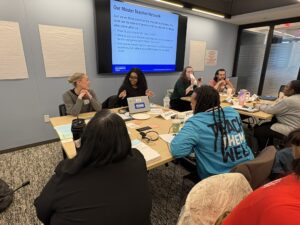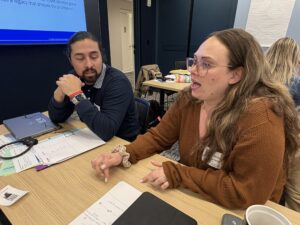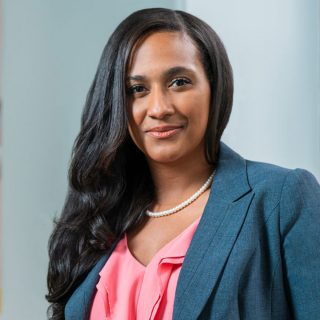
Every student deserves an excellent teacher. That’s why staff professional development is at the heart of Uncommon’s mission to prepare students for college and beyond. While most schools focus their attention and energy on teaching foundational skills to new teachers, Uncommon offers a dual pathway to student achievement: show new teachers the ropes and expand the skillset of experienced educators.
In fall 2024, Uncommon launched the Master Teacher Institute (MTI) with 50 teachers divided into two cohorts. The program was designed to meet the unique needs of already-effective teachers who wanted to grow past their current success level but lacked a clear path of development. The MTI offers a way forward and a destination: achieve a Master Teacher designation within a school year by showing evidence of student achievement, positive classroom culture, and strong instructional practices.
Give Experienced Teachers the Targeted Development They Crave
The Master Teacher Institute recognizes what effective teachers already do well, while refining or adding tools to their toolbox—what participants learn in the MTI can be immediately applied to their current work with students.
The bar for program admittance is high and data-driven, ensuring selected teachers have the skill and will to grow in community. Participants can direct energy into developing their own practice, rather than serving as troubleshooters for more struggling teachers (a common role that many experienced educators fall into).
“The biggest takeaway I have had from MTI is that my development as a teacher is still far from over,” said Christopher Lodge, a math teacher at Uncommon Brownsville South Middle School in Brooklyn. “The feedback I received has given me new ways to think about my instruction and has helped me push myself in my 7th year of teaching. I am now more reflective of my prompting, both in the questions I am asking, and being strategic about who I am asking them to.”

Build Like-Minded Community
A desire for growth and purposeful community fuel MTI. Educators from elementary to high school apply to join a cohort, and once selected, are divided into sub-groups based on content area (STEM and Humanities). This intentional grouping allows teachers to debrief content trends and helps educators zoom out and spot instructional patterns across schools.
These groups meet multiple times over the year. In preparation for each session, teachers record and submit three lessons and collect related student work. During the facilitator-led sessions, they celebrate progress to goal, review a fourth video to give and receive peer feedback, and discuss next steps with veteran coaches.
Joining an intentional, focused community can be transformative for those considering their future in the classroom. The Master Teacher Institute cohorts described in this article include teachers from five regions: Brooklyn, NY; Camden, NJ; Newark, NJ; Rochester, NY; and Boston, MA. A multi-city model was a deliberate choice: facilitators wanted teachers to work with others with whom they would not normally interact. This strategic community building allows teachers to foster relationships outside of their schools with like-minded colleagues and share best practices in real time.
Jexnika Chambers, 6th grade team leader and science teacher at Uncommon Excellence Boys Middle School in Brooklyn, has found the community aspect of MTI very beneficial. “One major takeaway I’ve gained from my experience in MTI is being able to learn from other teachers, even if they don’t teach the same content or grade level as I do. MTI is the extra support any teacher can ask for to help with their growth,” said Chambers.

Create Model Classrooms at Schools
The Master Teacher Institute develops and evaluates teacher skills with a normed rubric of set criteria and feedback protocols. Coaches review and score teachers’ filmed lessons and use the in-person meetings to give precise, tailored next steps. Earning an exemplary score in classroom culture and instructional rigor and showing a year or more in student growth earns participants a Master Teacher designation.
Reaching exemplary status is not just an individual achievement. Each newly minted Master teacher marks a collective victory. Educators return to their schools as model teachers, reliable examples of high-quality, rigorous instruction in the building. And better yet, each Master Teacher is now connected to a larger community dedicated to improving their practice for their own—and their students’—sake.
Skyler Wilburn, a North Star Academy West Side Park Middle School ELA teacher in Newark, believes that the MTI has improved his teaching and that his students will benefit in turn. “One major takeaway I’ve gained from MTI is to ensure that I am connecting things together throughout the unit so that students have a deeper understanding of the curriculum. A key way to do this is to ensure that I am stamping in student voice because students often internalize information from each other more than from us,” explained Wilburn.
Highly effective teachers need opportunities for growth and development that are not focused on triage or designed to take them out of the classroom. A Program like the Master Teacher Institute addresses experienced teachers’ desire for specialized support and development without ignoring their well-earned expertise. And when teachers feel seen, supported, and celebrated, they teach better, and students learn more.



